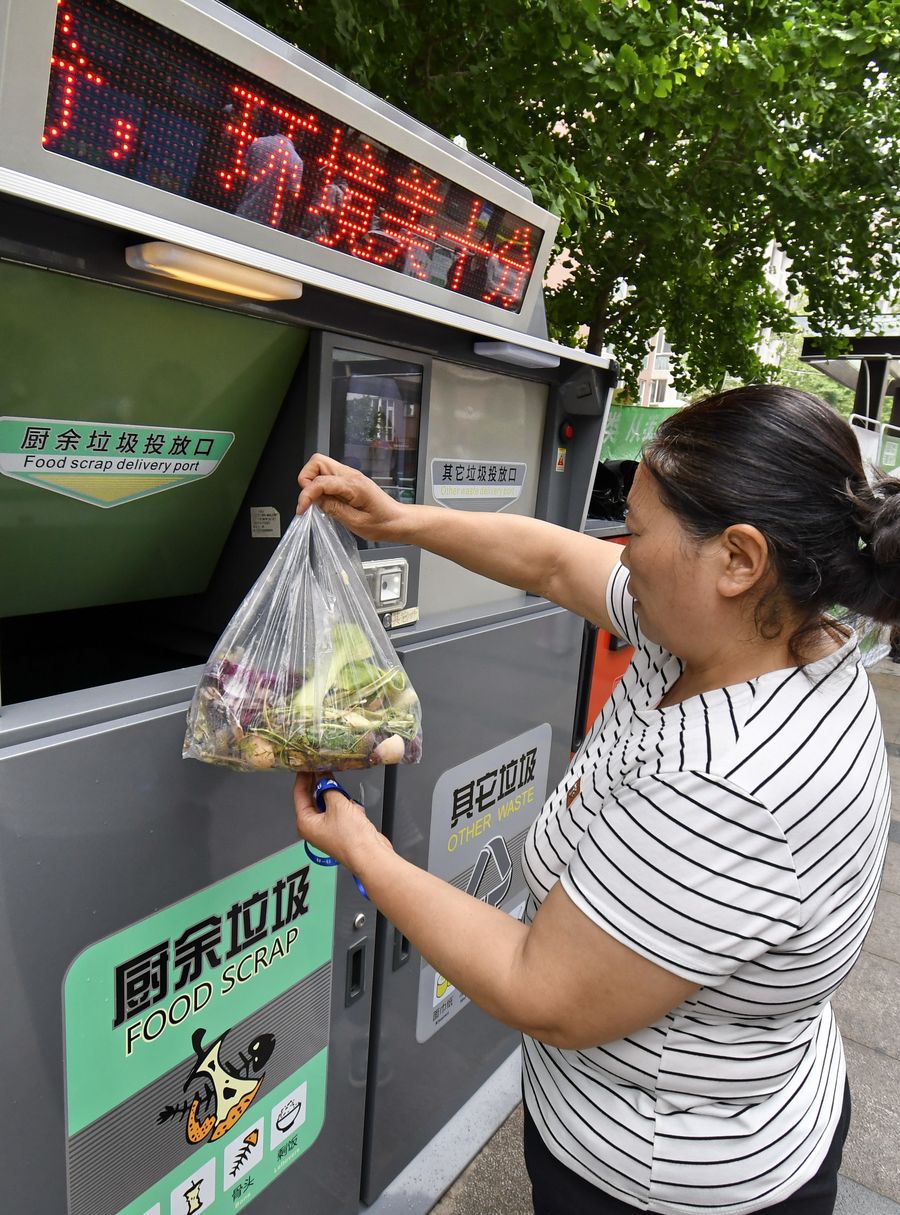
One resident threw kitchen waste into a smart trash can in Dongcheng District of Beijing on June 6, 2019. (Xinhua/Li Xin)
Units and individuals are required to sort garbage into four categories -- kitchen waste, recyclable waste, hazardous waste and other waste, according to a draft amendment to Beijing's household garbage management regulations.
BEIJING, Nov. 27 (Xinhua) -- Beijing will enforce a city-wide mandatory household garbage sorting system starting in May in a move to strengthen urban governance and prevent pollution.
Units and individuals are required to sort garbage into four categories -- kitchen waste, recyclable waste, hazardous waste and other waste, according to a draft amendment to Beijing's household garbage management regulations.
Individuals who fail to sort garbage and decline to rectify their behavior can be fined 50 yuan (about 7 U.S. dollars) to 200 yuan. Those who are willing to participate in community services, including household garbage sorting, will be exempt from paying fines.
"We want to change people's habits through education and guidance rather than punishment alone," said Hao Zhilan with the urban construction and environmental protection committee of the Beijing municipal people's congress.
The new rule was passed Wednesday at a session of the Standing Committee of the 15th Beijing Municipal People's Congress after it solicited opinions from 12,000 lawmakers and over 240,000 residents in August.
In order to reduce the waste at the source, the new regulations encourage the idea of going paperless at work and abandoning the use of disposable cups in Party and government offices as well as public institutions.
Supermarkets, shopping malls and trade markets are not allowed to use super-thin or free plastic bags. Restaurants, food delivery platforms and hotels shall stop offering disposable items unless customers ask.
Businesses who disobey the rules will face fines ranging from 5,000 yuan to 10,000 yuan. For frequent violators, the fine will be raised up to 50,000 yuan, according to the regulations.
Home to over 21 million residents, Beijing has long been troubled by mounting pressure of garbage disposal. The city collected 9.29 million tonnes of household waste in 2018, up 43.4 percent compared with that in 2012.
Last year, Beijing treated around 25,500 tonnes of waste each day, more than 86 percent of which was poured into incineration and landfill sites.
As one of the pioneers exploring trash sorting, Beijing published China's first domestic waste management regulations in 2011. The city has piloted compulsory trash sorting in thousands of schools, hospitals and government departments in recent years.
Song Guojun, researcher of environmental economics with the Renmin University of China, said the revised regulations can help Beijing strengthen its efforts in city governance and pollution prevention, boost public awareness and promote garbage sorting.
Beijing's part in tackling waste comes amid China's efforts to win the war on a growing mountain of garbage and establish a circular economy. Before Beijing, Shanghai began enforcing a mandatory garbage sorting system in July.
China plans to establish garbage sorting systems in 46 major cities by the end of 2020 and expand it to cover all cities at the prefecture-level and above by 2025.
"Trash sorting will revolutionize our way of life and modernize the urban governance system and capacity," Hao said. However, it will still take more work to develop the habit of sorting waste for residents.
An official survey showed that only 20 percent of the sampled can accurately discard kitchen waste in trash bins.
"The promotion of garbage sorting across Beijing is a long and tough war. It requires input from individuals, government and enterprises," Hao said, adding that the government will offer training for residents and make trash sorting a new fad. ■



